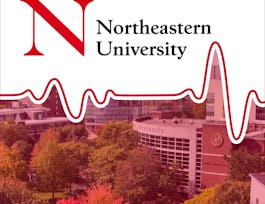In this course each student will create a scientific animation that tells a story with data to better communicate scientific results – along the way they will learn programming, science writing, and technical animation skills.



Data-Driven Animation for Science Communication

Instructor: Dr. Jessica Kendall-Bar
Sponsored by Louisiana Workforce Commission
3,930 already enrolled
(13 reviews)
Recommended experience
What you'll learn
Learners will be able to replicate the data-driven animation process from conceptualization to asset creation, data visualization, and composition.
Learners will be able to make informed decisions between available programs and techniques for visualizing data.
Learners will be able to distill the methods, results, and implications of scientific research into an accessible, succinct, and impactful animation.
Details to know

Add to your LinkedIn profile
11 assignments
See how employees at top companies are mastering in-demand skills


Earn a career certificate
Add this credential to your LinkedIn profile, resume, or CV
Share it on social media and in your performance review

There are 5 modules in this course
In this Module you will lay out the groundwork for your data-driven animation. You will pick a scientific study, tell its story, interpret a dataset, and compose a style guide that determines the fonts, colors, and mood of your animation. Using your script and style guide, you will plan out the action for each scene in your animation. After that, you will create a storyboard conveying the major action in your animation and, from that storyboard, create an animatic.
What's included
16 videos17 readings3 assignments1 peer review2 discussion prompts
In this Module you will use the animatic and list of assets from the last session to decide which custom assets to create. You will learn digital illustration techniques in Adobe Illustrator and Adobe Photoshop to create these assets with specific attention paid to the future ability to animate the assets. We will create data visualizations, learning about different tools, programs, and guiding principles.
What's included
26 videos2 readings2 assignments2 discussion prompts
In this Module you will develop one of the scenes from your animatic into an animated scene that incorporates motion graphic principles. You will learn how to animate text, lines, and shapes in Adobe After Effects. You will also create an animated version of your improved key figure. We will learn to use JavaScript programming within Adobe After Effects to link data to the attributes of an animated 2D scene.
What's included
21 videos4 readings3 assignments2 discussion prompts
In this Module you will familiarize yourself with the interface of a 3D animation software, Autodesk Maya. You will use your own custom 3D model or a demo file to animate a locomotion cycle (walk, swim, fly, etc., depending on your organism). You will learn about the major steps of creating a 3D animation from modeling and rigging to animation and rendering. You will use the locomotion cycle to create a data-driven animation. We will learn how to use Python programming in Autodesk Maya to create data-driven 3D scenes.
What's included
17 videos4 readings1 assignment2 discussion prompts
In this Module you will assemble the animated scenes you have generated into a fully produced animation. You will learn the basics of editing and composition using an Adobe workflow between Adobe Premiere Pro and Adobe After Effects. We will learn about the importance and power of musical accompaniment in creating your final composition. You will critique each other’s final projects in a peer reviewed assignment.
What's included
10 videos3 readings2 assignments1 peer review1 discussion prompt
Instructor

Offered by
Why people choose Coursera for their career




Learner reviews
13 reviews
- 5 stars
76.92%
- 4 stars
15.38%
- 3 stars
7.69%
- 2 stars
0%
- 1 star
0%
Showing 3 of 13
Reviewed on Nov 20, 2024
Amazing Course to cover all things in animation field
Recommended if you're interested in Data Science

Northeastern University

Coursera Project Network

Vanderbilt University

Open new doors with Coursera Plus
Unlimited access to 10,000+ world-class courses, hands-on projects, and job-ready certificate programs - all included in your subscription
Advance your career with an online degree
Earn a degree from world-class universities - 100% online
Join over 3,400 global companies that choose Coursera for Business
Upskill your employees to excel in the digital economy



